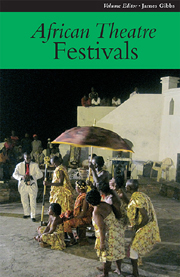Book contents
- Frontmatter
- Contents
- Notes on Contributors
- Obituary of Efo Kodjo Mawugbe
- Introduction by James Gibbs
- Festivals as a Strategy for the Development of Theatre in Zimbabwe 1980–2010
- The Legacy of Festac '77
- Festac, Month by Month & Soyinka's Involvement
- The Dakar Festivals of 1966 & 2010
- African Renaissance between Rhetoric 30 & the Aesthetics of Extravagance FESMAN 2010 – Entrapped in Textuality
- Theatre Programme for FESMAN & Commentary
- The Pan-African Historical Theatre Festival (PANAFEST) in Ghana, 1992–2010
- PANAFEST through the Headlines
- International Festivals & Transnational Theatre Circuits in Egypt, 1988–2010
- The Jos Theatre Festival 2004–2011
- The Grahamstown Festival & the Making of a Dramatist An interview with ANDREW BUCKLAND
- Playscript
- Book Reviews
The Dakar Festivals of 1966 & 2010
Published online by Cambridge University Press: 05 May 2013
- Frontmatter
- Contents
- Notes on Contributors
- Obituary of Efo Kodjo Mawugbe
- Introduction by James Gibbs
- Festivals as a Strategy for the Development of Theatre in Zimbabwe 1980–2010
- The Legacy of Festac '77
- Festac, Month by Month & Soyinka's Involvement
- The Dakar Festivals of 1966 & 2010
- African Renaissance between Rhetoric 30 & the Aesthetics of Extravagance FESMAN 2010 – Entrapped in Textuality
- Theatre Programme for FESMAN & Commentary
- The Pan-African Historical Theatre Festival (PANAFEST) in Ghana, 1992–2010
- PANAFEST through the Headlines
- International Festivals & Transnational Theatre Circuits in Egypt, 1988–2010
- The Jos Theatre Festival 2004–2011
- The Grahamstown Festival & the Making of a Dramatist An interview with ANDREW BUCKLAND
- Playscript
- Book Reviews
Summary
It is not easy to compare the 1966 Festival held in Dakar with that held in 2011, but a glance at the programmes offered and of the people involved immediately shows the difference. Briefly, the organisers of the 2010 Festival were unable to find good actors to fill the programmes, and could not match the well-known artists and the great men of culture who had been involved in the 1966 edition.
This time the organisation was poor. During the second festival, people were often uncertain when and where events were going to take place. When you asked people about what was going on, the answer would invariably be: ‘Nothing new is happening.’
Some say that the confusion was created because those in charge of the organisation of the event had nothing to do with culture. Dissatisfaction with the administration continues and up till now (May 2011) many of those employed during the festival have still not been paid and are running after their money.
Very sadly, the population as a whole did not feel involved in the recent festival. The general opinion was that the scheduling was poor - since it was held at a time when people had other, more basic concerns, including food and electricity. As the Latin expression goes: ‘Primum vivere’ (live first … philosophise later). All this makes me think that our people are worryingly and unconsciously sliding towards some kind of philistinism.
- Type
- Chapter
- Information
- African Theatre 11: Festivals , pp. 28 - 29Publisher: Boydell & BrewerPrint publication year: 2012



